Landscape Gardening in Ealing
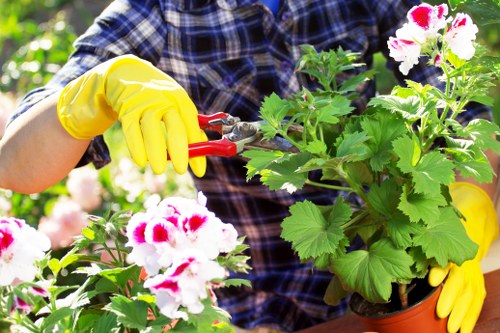
Welcome to the vibrant world of landscape gardening in Ealing, where the fusion of natural beauty and creative design transforms outdoor spaces into serene retreats. Whether you're a homeowner looking to revamp your garden or a business seeking to enhance your commercial property, landscape gardening offers endless possibilities to express your style and improve your environment.
Ealing, known for its lush parks and historic architecture, provides an ideal backdrop for garden enthusiasts. The local climate, characterized by mild winters and warm summers, allows for a diverse range of plants and landscaping features. This versatility enables gardeners to experiment with various styles, from traditional English gardens to modern, minimalist designs.
Engaging in landscape gardening not only enhances the aesthetic appeal of your property but also contributes to the overall well-being of the community. Green spaces have been proven to reduce stress, improve air quality, and foster social interaction among residents. By investing in landscape gardening in Ealing, you're contributing to a healthier, more vibrant neighborhood.
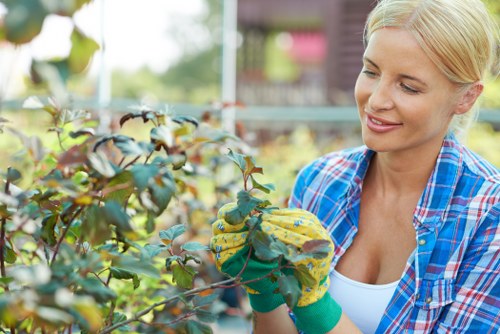
The Benefits of Professional Landscape Gardening
Opting for professional landscape gardening services in Ealing can make a significant difference in the outcome of your outdoor space. Experts bring a wealth of knowledge and experience, ensuring that your garden thrives year-round. Here are some key benefits of hiring professionals:
1. Expert Design and Planning
Professional landscapers have the skills to create a cohesive design that complements your property's architecture and surroundings. They consider factors such as soil quality, sunlight exposure, and drainage to select the best plants and materials for your garden.
Additionally, they can incorporate sustainable practices, such as using native plants and implementing efficient irrigation systems, to minimize environmental impact and reduce maintenance costs.
Outcome: A beautifully designed garden that enhances your property's value and appeal.
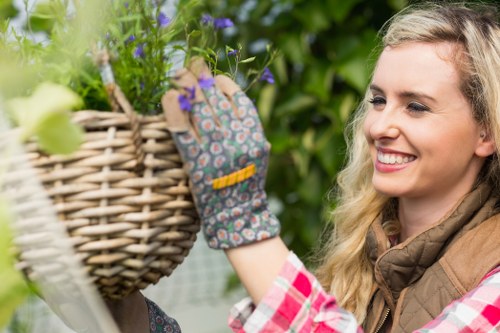
Key Elements of Landscape Gardening
A successful landscape garden integrates various elements harmoniously. Understanding these components is crucial for creating a balanced and aesthetically pleasing outdoor space. Here are the primary elements to consider:
- Plants and Flora: Choose a mix of trees, shrubs, perennials, and annuals that thrive in Ealing's climate.
- Hardscaping: Incorporate features like patios, pathways, fences, and garden structures to add structure and functionality.
- Water Features: Ponds, fountains, and waterfalls can enhance the ambiance and attract wildlife.
- Lighting: Proper lighting highlights key areas of your garden and extends its usability into the evening.
- Outdoor Furniture: Comfortable seating and dining areas create inviting spaces for relaxation and entertainment.
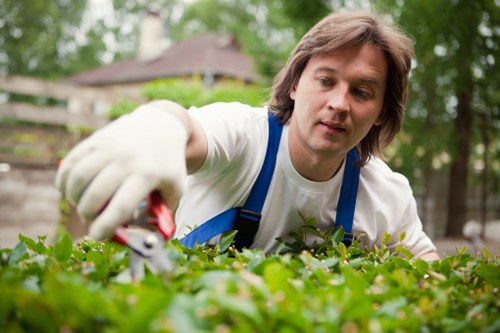
Choosing the Right Plants for Ealing Gardens
Selection of plants is a cornerstone of effective landscape gardening. In Ealing, gardeners can benefit from the region's temperate climate by choosing a variety of plants that flourish throughout the seasons. Consider the following when selecting plants:
Native Plants
Opting for native species ensures that your garden is sustainable and requires less maintenance. Native plants are well-adapted to the local climate, pests, and soil conditions, making them a resilient choice.
Some popular native plants for Ealing gardens include lavender, hydrangeas, foxgloves, and English oak trees. These plants not only add beauty but also support local wildlife, including bees and butterflies.
Pro Tip: Consult with local nurseries or landscape gardeners to identify the best native plants for your specific garden conditions.
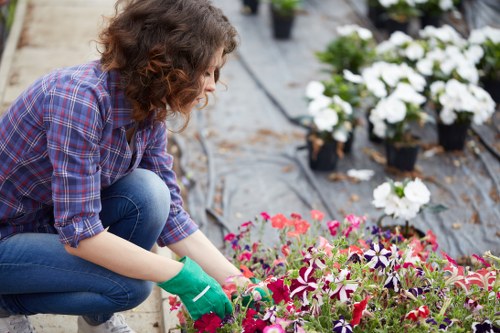
Maintenance Tips for a Thriving Garden
Maintaining a beautiful garden requires regular care and attention. Whether you choose to manage the garden yourself or hire professionals, following these maintenance tips will help ensure its longevity and vibrancy:
1. Regular Pruning
Pruning helps shape plants, promotes healthy growth, and prevents the spread of diseases. Regularly remove dead or damaged branches and trim plants to maintain their desired form.
2. Proper Watering
Ensure that your garden receives adequate water, especially during dry spells. Implementing efficient irrigation systems, such as drip irrigation, can save water and ensure deep watering of plant roots.
3. Weeding and Mulching
Keep your garden free from weeds that compete with your plants for nutrients and water. Applying mulch not only suppresses weed growth but also helps retain soil moisture and regulate temperature.
4. Soil Health
Regularly test your soil and amend it as necessary to maintain optimal fertility and pH levels. Adding compost or organic matter can improve soil structure and provide essential nutrients to your plants.
5. Pest and Disease Control
Monitor your garden for signs of pests and diseases. Use organic or chemical treatments as needed, and practice integrated pest management to minimize harm to beneficial insects and the environment.
Conclusion: Consistent maintenance is key to enjoying a lush and healthy garden throughout the year.

Popular Landscape Gardening Styles in Ealing
Ealing offers a rich tapestry of architectural styles, and your landscape garden can either complement or contrast these structures. Here are some popular landscape gardening styles embraced in Ealing:
1. Traditional English Garden
The traditional English garden is characterized by lush flower beds, neatly trimmed hedges, and picturesque pathways. This style emphasizes symmetry and order, often incorporating classic elements like pergolas, gazebos, and water features.
- Plants: Roses, foxgloves, lavender, and hydrangeas.
- Features: Winding paths, arbours, and vintage-style garden furniture.
2. Modern Minimalist Garden
For those who prefer a sleek and uncluttered aesthetic, the modern minimalist garden focuses on clean lines, simple forms, and a restrained color palette. This style often uses hardscaping elements prominently, creating a striking contrast with the greenery.
- Plants: Ornamental grasses, evergreen shrubs, and succulents.
- Features: Concrete patios, geometric planters, and minimalist lighting.
3. Cottage Garden
The cottage garden style exudes charm and whimsy, with a mix of colorful flowers, herbs, and climbing plants. It's perfect for creating a romantic and relaxed atmosphere, often featuring a variety of textures and fragrances.
- Plants: Poppies, daisies, thyme, and climbing roses.
- Features: Wooden fences, rustic benches, and eclectic garden décor.

Integrating Sustainable Practices
Sustainability is becoming increasingly important in landscape gardening. By incorporating eco-friendly practices, you can create a beautiful garden that's also kind to the environment. Here are some sustainable gardening tips:
1. Rainwater Harvesting
Collecting rainwater reduces your reliance on mains water and provides a natural source of hydration for your plants. Install rain barrels or a rainwater harvesting system to capture and store rainwater for garden use.
2. Composting
Composting kitchen scraps and garden waste enriches your soil with essential nutrients, reducing the need for chemical fertilizers. It also helps divert waste from landfills, contributing to a greener planet.
3. Native and Drought-Resistant Plants
Choosing native and drought-resistant plants minimizes water usage and supports local biodiversity. These plants are adapted to the local climate and require less maintenance and resources to thrive.
4. Organic Pest Control
Using organic methods to manage pests and diseases preserves the natural balance in your garden. Techniques such as introducing beneficial insects, using natural repellents, and practicing crop rotation can effectively control unwanted pests.
5. Green Manure
Cultivating green manure crops, like clover or alfalfa, improves soil fertility and structure. These plants add organic matter to the soil, enhancing its ability to retain moisture and nutrients.

Seasonal Gardening in Ealing
Understanding the seasonal changes in Ealing is essential for maintaining a thriving garden year-round. Each season offers unique opportunities and challenges that can impact your landscape gardening efforts.
Spring
Spring is a time of renewal, making it perfect for planting new flowers and shrubs. Focus on preparing your soil, planting bulbs, and sowing seeds for a vibrant summer bloom.
Summer
During summer, ensure your garden receives adequate water and mulch to retain soil moisture. Prune overgrown plants and enjoy the full bloom of summer flowers.
Autumn
Autumn is ideal for planting trees and perennials. Clear fallen leaves and debris to prevent disease and prepare your garden for the cooler months.
Winter
While winter may slow down garden activity, it's a time to plan for the upcoming year. Protect sensitive plants, supply proper insulation, and consider garden enhancements for spring.
Tip: Adapting your gardening practices to each season ensures the health and beauty of your landscape throughout the year.

Choosing the Right Landscape Gardener in Ealing
Selecting a reputable landscape gardener is crucial for achieving your desired garden transformation. Here are some tips to help you choose the best professional for your needs:
1. Experience and Portfolio
Review the gardener's portfolio to assess their style and expertise. An experienced landscape gardener will have a diverse range of projects and satisfied clients.
2. Certifications and Memberships
Look for certifications from recognized horticultural organizations and memberships in professional bodies. These credentials indicate a commitment to quality and ongoing professional development.
3. References and Reviews
Ask for references from past clients and read online reviews to gauge the gardener's reliability and customer satisfaction levels.
4. Transparency and Communication
A good landscape gardener should be transparent about pricing, timelines, and the scope of work. Effective communication ensures that your vision is understood and executed accurately.
5. Sustainable Practices
If sustainability is important to you, inquire about the gardener's approach to eco-friendly gardening and their use of sustainable materials and methods.
Conclusion: Taking the time to vet potential landscape gardeners ensures that your investment results in a beautiful and functional outdoor space.

Enhancing Your Garden with Lighting
Garden lighting plays a pivotal role in extending the usability of your outdoor space into the evening hours. Proper lighting highlights key features, adds ambiance, and ensures safety. Here are some lighting ideas for your landscape garden in Ealing:
1. Pathway Lighting
Illuminate walkways with solar or low-voltage lights to guide guests safely through your garden at night. Pathway lighting adds a welcoming touch and prevents accidents.
2. Accent Lighting
Use accent lighting to highlight architectural features, such as pergolas, statues, or water features. Spotlights and floodlights can create dramatic effects and draw attention to focal points.
3. Ambient Lighting
Create a warm and inviting atmosphere with ambient lighting. String lights, lanterns, and LED strips can provide soft illumination, perfect for outdoor dining and relaxation areas.
4. Underplanting Lights
Install lights beneath trees or shrubs to create enchanting shadows and depth in your garden. This technique adds a magical quality to your outdoor space.
5. Security Lighting
Incorporate security lighting to deter intruders and enhance the safety of your property. Motion-sensor lights are an effective option for this purpose.
Tip: Choose energy-efficient lighting options, such as LED or solar-powered lights, to reduce energy consumption and lower utility bills.

Incorporating Hardscaping Elements
Hardscaping refers to the non-living components of your garden, such as patios, decks, fences, and pathways. These elements provide structure and functionality, complementing the natural beauty of your plants and flowers. Here are some popular hardscaping ideas for landscape gardening in Ealing:
1. Patios and Decks
Creating outdoor living spaces with patios and decks allows you to enjoy your garden comfortably. Choose materials like stone, brick, or wood to match your home's aesthetic.
2. Garden Paths
Pathways made from gravel, paving stones, or decorative concrete guide visitors through your garden and connect different areas. They add charm and accessibility to your outdoor space.
3. Fencing and Walls
Fences and walls provide privacy, define boundaries, and add architectural interest. Consider materials that complement your garden's style, such as timber, metal, or stone.
4. Garden Structures
Incorporate structures like pergolas, gazebos, and arbors to create shaded areas and focal points. These structures offer a place to relax and enjoy your garden.
5. Outdoor Kitchens and Fireplaces
For those who love to entertain, outdoor kitchens and fireplaces expand your living space. They enable you to host gatherings and enjoy meals al fresco.
Conclusion: Integrating hardscaping elements enhances the functionality and visual appeal of your garden, creating a harmonious balance between natural and constructed features.

Creating a Wildlife-Friendly Garden
Designing a wildlife-friendly landscape garden in Ealing supports local biodiversity and creates a lively, dynamic outdoor environment. By providing habitats and food sources, you can attract a variety of wildlife, including birds, butterflies, and beneficial insects. Here are some tips to create a wildlife-friendly garden:
1. Plant Diversity
Incorporate a wide range of plants to provide nectar, seeds, and shelter for different species. Choose native flowers, shrubs, and trees that support local wildlife.
2. Water Sources
Install water features like birdbaths, ponds, or small streams to offer drinking and bathing water for animals. Ensure that water sources are clean and safe for wildlife.
3. Nesting Sites
Provide nesting boxes, birdhouses, and shelters for birds and small mammals. Leave some areas of your garden undisturbed to offer natural nesting sites.
4. Avoid Pesticides
Minimize the use of chemical pesticides and fertilizers, which can harm beneficial insects and other wildlife. Opt for organic pest control methods instead.
5. Create Layers
Design your garden with multiple layers, including ground cover, mid-level shrubs, and canopy trees. This structure mimics natural habitats and provides diverse environments for wildlife.
Note: A wildlife-friendly garden not only benefits the ecosystem but also adds a sense of tranquility and natural beauty to your outdoor space.

Seasonal Color: Planting for Year-Round Beauty
To maintain an attractive garden throughout the year, it's essential to plan for seasonal color variations. By selecting plants that bloom at different times, you can ensure continuous visual interest in your landscape garden. Here's how to achieve year-round beauty:
Spring Blooms
Plant bulbs like tulips, daffodils, and crocuses to add vibrant colors in spring. Early-flowering shrubs, such as lilacs and forsythias, also contribute to a lively garden atmosphere.
Summer Flowers
Summer is perfect for annuals and perennials that offer bold and bright colors. Roses, delphiniums, and hydrangeas are excellent choices for this season.
Autumn Hues
In autumn, focus on plants that display rich autumnal colors, such as asters, chrysanthemums, and ornamental grasses. These plants add warmth and depth to your garden as the days grow shorter.
Winter Interest
While winter may seem barren, you can still incorporate plants and features that add visual interest. Evergreen shrubs, holly, and winter-blooming flowers like hellebores provide color and texture during the colder months.
Evergreen Plants
Evergreen trees and shrubs maintain their foliage year-round, providing structure and greenery even in winter. They are essential for creating a balanced and enduring landscape.
Tip: Plan your garden layout by considering the bloom times of each plant to ensure a seamless transition of colors through the seasons.

Hardy Shrubs and Trees for Ealing Gardens
Selecting the right shrubs and trees is fundamental to establishing a resilient and visually appealing landscape garden in Ealing. Hardy plants are capable of withstanding the local climate and contributing to the longevity of your garden. Here are some recommended hardy shrubs and trees:
1. Boxwood (Buxus)
Boxwood is a versatile evergreen shrub ideal for hedges, borders, and topiary. Its dense foliage provides structure and can be easily shaped to fit various design themes.
2. Holly (Ilex)
Holly shrubs offer year-round interest with their glossy, evergreen leaves and bright red berries. They are excellent for adding color and providing shelter for wildlife.
3. English Oak (Quercus robur)
The English oak is a majestic tree that can grow to impressive heights. It provides extensive shade and serves as a habitat for numerous species, enhancing biodiversity in your garden.
4. Rhododendron
Rhododendrons are prized for their large, colorful blooms and glossy evergreen leaves. They thrive in partially shaded areas and add a burst of color in spring.
5. Camellia
Camellias produce stunning flowers during the cooler months, adding beauty to your garden when other plants may be dormant. Their evergreen foliage ensures year-round appeal.
Pro Tip: Consult with a local nursery or landscape gardener to select varieties that are well-suited to Ealing's climate and soil conditions.

Incorporating Edible Plants
Blend beauty with functionality by incorporating edible plants into your landscape garden. Growing your own herbs, vegetables, and fruit not only provides fresh produce but also adds unique textures and colors to your garden. Here's how to integrate edibles seamlessly:
1. Herb Gardens
Create a dedicated herb garden with varieties like basil, rosemary, thyme, and mint. These plants are easy to grow and can be placed near outdoor kitchen areas for convenient access.
2. Vegetable Beds
Allocate space for vegetable beds to cultivate a variety of produce, such as tomatoes, cucumbers, peppers, and leafy greens. Raised beds can improve soil quality and drainage.
3. Fruit Trees and Bushes
Plant fruit trees like apple, pear, and cherry to enjoy seasonal harvests. Berry bushes, such as raspberries and blueberries, also add color and provide delicious fruits.
4. Edible Landscaping
Incorporate edible plants into your existing garden design. For example, use edible ground covers like strawberries or plant vegetables alongside ornamental flowers for a visually appealing and productive garden.
5. Vertical Gardens
Maximize space by using vertical gardening techniques. Trellises, wall-mounted planters, and hanging baskets can support climbing plants like beans and cucumbers, adding dimension to your garden.
Benefit: Combining ornamental and edible plants creates a multifunctional garden that is both beautiful and practical.

Creating Outdoor Living Spaces
Your landscape garden should be a place where you can relax, entertain, and enjoy nature. Designing functional outdoor living spaces enhances the usability and enjoyment of your garden. Here are some ideas to create inviting outdoor areas:
1. Seating Areas
Incorporate various seating options, such as benches, lounge chairs, or a dining set, to provide comfortable spots for relaxation and socializing.
2. Pergolas and Gazebos
Structures like pergolas and gazebos offer shade and a focal point for outdoor gatherings. They can be adorned with climbing plants or equipped with lighting to create a cozy ambiance.
3. Fire Pits and Fireplaces
Adding a fire pit or an outdoor fireplace creates a warm and inviting atmosphere, perfect for evening gatherings and roasting marshmallows.
4. Outdoor Kitchens
For those who love to cook, an outdoor kitchen with a grill, countertop, and storage can extend your culinary activities into the garden.
5. Water Features
Incorporate water features like fountains, ponds, or waterfalls in your outdoor living spaces to add tranquility and enhance the sensory experience.
Tip: Plan your outdoor living areas to maximize comfort and functionality, ensuring they complement the overall garden design.

Utilizing Garden Accessories and Decorations
Garden accessories and decorations add personality and character to your landscape garden. Thoughtfully chosen elements can enhance the aesthetic appeal and reflect your personal style. Here are some ideas for garden accessories:
1. Sculptures and Statues
Incorporate sculptures or statues to serve as focal points or conversation starters. Choose pieces that complement your garden's theme and scale.
2. Decorative Pots and Planters
Use stylish pots and planters to display flowers and herbs. They add color and can be moved to highlight different areas of the garden.
3. Garden Art
Install garden art, such as metal wall art, mosaic pathways, or painted stones, to introduce unique visual elements and enhance the garden's charm.
4. Furniture and Decor
Select outdoor furniture and décor that are both functional and aesthetically pleasing. Cushions, throws, and outdoor rugs can add comfort and style.
5. Lighting Fixtures
Incorporate decorative lighting fixtures, such as lanterns, string lights, and solar-powered stakes, to create ambiance and highlight garden features.
Conclusion: Accessories and decorations personalize your garden, making it a true reflection of your tastes and interests.

Implementing Irrigation Systems
Efficient irrigation is essential for maintaining a healthy and thriving landscape garden. Proper watering ensures that your plants receive the necessary moisture without wasting water. Here are some irrigation system options for your Ealing garden:
1. Drip Irrigation
Drip irrigation delivers water directly to the plant roots, reducing evaporation and water runoff. It's an efficient and effective method, especially for garden beds and shrubs.
2. Sprinkler Systems
Sprinkler systems are ideal for larger lawns and open areas. They provide uniform water coverage, but it's important to adjust settings to prevent overwatering.
3. Soaker Hoses
Soaker hoses are porous and allow water to seep slowly into the soil. They are easy to install and suitable for vegetable gardens and flower beds.
4. Rainwater Harvesting Systems
Integrate rainwater harvesting systems with your irrigation setup to utilize natural rainfall. This sustainable approach reduces dependency on mains water and lowers utility costs.
5. Smart Irrigation Controllers
Smart controllers adjust watering schedules based on weather conditions, soil moisture, and plant needs. They optimize water usage and enhance irrigation efficiency.
Tip: Regularly inspect and maintain your irrigation system to ensure it operates efficiently and delivers water where it's needed most.

Planning for Garden Expansion
As your landscape garden grows, you may consider expanding its size and adding new features. Proper planning ensures that your garden remains functional and harmonious with its surroundings. Here are some considerations for garden expansion:
1. Assess Available Space
Evaluate the current layout and determine how additional space can be utilized effectively. Consider factors like sunlight, soil quality, and existing structures.
2. Define Purpose
Decide on the primary functions of the expanded area, such as additional seating, gardening beds, or recreational spaces. Clear objectives guide the design process.
3. Seamless Integration
Ensure that new elements blend seamlessly with the existing garden. Maintain consistency in materials, color schemes, and design styles to create a unified look.
4. Budget Planning
Establish a budget for the expansion project, considering costs for materials, labor, and any professional services required. Allocate funds wisely to prioritize essential features.
5. Future-Proofing
Plan for future growth by selecting adaptable plants and versatile structures. This approach allows your garden to evolve organically over time.
Conclusion: Thoughtful planning is key to successfully expanding your landscape garden, ensuring it continues to meet your needs and aesthetic preferences.

Final Thoughts on Landscape Gardening in Ealing
Embracing landscape gardening in Ealing opens up a world of creative possibilities to enhance your outdoor living spaces. From selecting the right plants and hardscaping elements to implementing sustainable practices and designing functional areas, every aspect contributes to a beautiful and thriving garden.
By investing time and resources into your landscape garden, you not only elevate the aesthetic appeal of your property but also create a sanctuary that supports your well-being and fosters a connection with nature. Whether you're undertaking the project yourself or collaborating with professional gardeners, the rewards are well worth the effort.
Ready to transform your garden? Contact us today to explore how our landscape gardening services in Ealing can bring your vision to life. Let us help you create an outdoor space that you'll love for years to come!